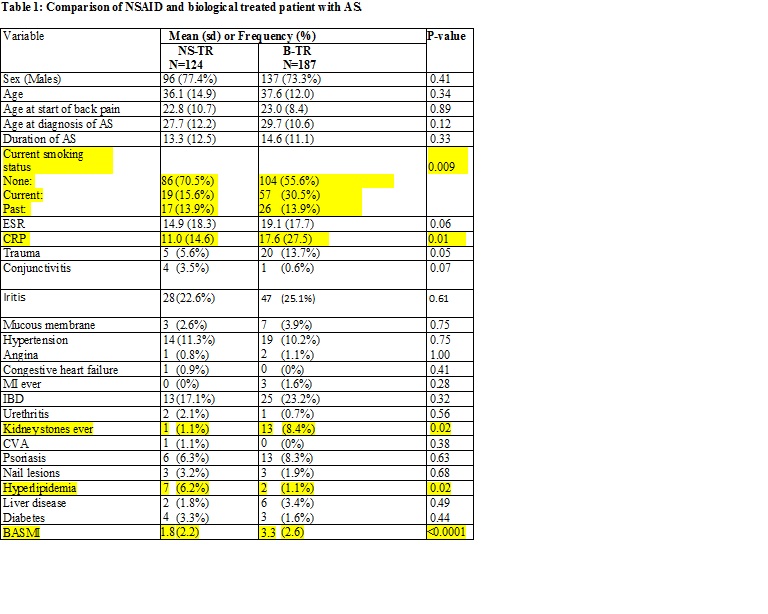Session Information
Session Type: Abstract Submissions (ACR)
Background/Purpose
Ankylosing spondylitis (AS) is a chronic inflammatory rheumatic disease with unpredictable course of progression. Treatment of AS thus should be tailored according to disease manifestation. There is group of patient with ankylosing spondylitis controlled with non-steroidal anti-inflammatory drugs alone, while the other subset may show high disease activity despite conventional treatments with NSAIDS and may require further therapeutic agents. The aim of study is to compare AS patients well controlled with NSAIDS alone with the other group requiring biologic therapy because of NSAID-nonresponsiveness.
Methods
This retrospective study involved data collection from the last clinic visit for 417 patients with a diagnosis of AS based on the modified New York criteria for AS. NSAID-treated patients (n=124) were defined as having a BASDAI<=4 at the last clinic visit while being treated with only NSAIDs, Biological-treated patient (n= 187) had failed to respond to a trial of ³ NSAIDS. The comparison of NSAID treated (NS-TR) and biologic treated (B-TR) was done in relation to multiple social, clinical and laboratory variables.
Results
NS-TR patients were found to have a lower incidence of smoking (P<0.0009), lower CRP (p=0.01), lower incidence of kidney stones (P= 0.02), increase in hyperlipidemia (P= 0.02) and better spinal mobility (P<0.0001). There were no significant differences in the following variables: gender, age of onset, eye disease, hypertension, diabetes, cardiac disease, uveitis, psoriasis, inflammatory bowel disease.
Conclusion
This study showed that the NSAID-responsive AS patients tend to be non-smokers, with lower baseline CRP, and less impairment in spinal mobility at baseline. Conversely, age, gender, and B27 status which have previously been implicated as markers of severity, did not correlate with NSAID-responsiveness. This analysis begins to provide a profile of AS patients who at baseline are likely to require biologic therapy for their disease.
Disclosure:
M. Bedaiwi,
None;
A. Thavaneswaran,
None;
N. Haroon,
None;
A. Anton,
None;
R. D. Inman,
Advisory board and grant,
5.
« Back to 2014 ACR/ARHP Annual Meeting
ACR Meeting Abstracts - https://acrabstracts.org/abstract/profiling-ankylosing-spondylitis-patients-likely-to-respond-to-nsaid-treatment/

